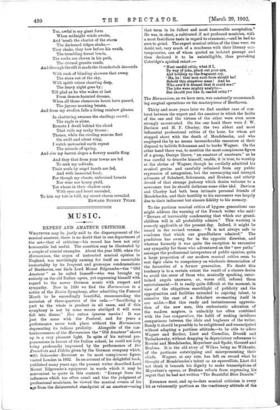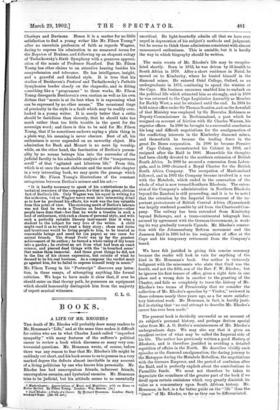MUSIC.
EXPERT AND AMATEUR CRITICISM.
WHATEVER maybe. justly said to the disparagement of the musical amateur, there is no doubt that in one department of the art—that of criticism—his record has been not only honourable but useful. The assertion may be illustrated by a couple of crucial examples. About the year 1830, when the Harmonicon, the organ of instructed musical opinion in England, was unwittingly earning for itself an unenviable immortality by its frequent and grotesque condemnations of Beethoven, one finds Lord Mount Edgcumbe—the " Old Amateur " as he called himself—who was brought up entirely on the old Italian opera, yet expressing himself with regard to the newer German music with respect and sympathy. Now in 1830 we find the Harmonicon in a notice of the Eroica Symphony, after admitting the Funeral March to be exceedingly beautiful, recommending the omission of three-quarters of the coda :—" Sacrificing a part to the whole is prudent in all cases, and if this symphony is not by some means abridged it will soon fall into disuse." Heu vatum ignarae invites ! It was just the same with the Pastoral, and for years a performance never took place without the Harmonicon deprecating its tedious prolixity. Alongside of the can- tankerousness of the Harmonicon the " Old Amateur" shows up in a very pleasant light. In spite of his natural pre- possessions in favour of the Italian school, he could not help being profoundly impressed by the performance of Der Freischntz and Fidelio given by the German company which, with Schroeder - Devrient as its most conspicuous figure, visited London in 1832. In an account of his delightful book, published many years ago, the present writer described Lord Mount Edgcumbe's equipment in words which it may be convenient to quote in this context: "Exempt from the influences which too often assail and bias the judgment of professional musicians, he viewed the musical events of his age from the disinterested standpoint of an amateur—using
that term in its fullest and most honourable acceptation."
He was, in short, a cultivated. if not profound musician, with a most fastidious taste in regard to ornament,—and he had no axes to grind. The expert musical critics of the time were, we doubt not, very much of a muchness with their literary cea- temporaries, one of whom quoted an isolated passage and then declared it to be unintelligible, thus provoking Coleridge's spirited retort :— " Most candid critic, what if I,
By way of joke, pluck out your eye, And holding up the fragment cry,
Ha, ha ! that men such fools should be!
Behold this shapeless mass ! And he Who own'd it dreamt that it could see I ' The joke were mighty analytic— But should you like it, candid critic ?
The Harmonicon, as we have seen, was constantly recommend. ing surgical operations on the masterpieces of Beethoven.
Thirty and more years later we find another case of con- trast between the expert and the amateur in which the faults of the one and the virtues of the other were even more strongly accentuated. On the one hand there were J. W.
Davison and H. P. Chorley; the two ablest and most influential professional critics of the hour, for whom art stopped short with the death of Mendelssohn, and who employed the by no means inconsiderable resources at their disposal to belittle Schumann and to burke Wagner. On the other hand there was, to mention the most conspicuous figure of a group, George Grove, " an amateur of amateurs," as he was careful to describe himself, unable, it is true, to worship at the shrine of Wagner, though he cordially admitted his musical genius and carefully refrained from any public expression of antagonism, but the unwearying and intrepid advocate of Schubert, Schumann, and Brahms, and utterly devoid of that strange jealousy which denies welcoisie to a newcomer lest he should dethrone some elder idol. Davison and Chorley had both been intimate personal friehds of Mendelssohn, and their hostility to his successors was largely due to their indiscreet but sincere fidelity to his memory.
To the partisan musical critics of bygone generations one might address the warning of the French writer who said : " Beware of irrevocably condemning that which our grand. children will in all probability admire." This warning is scarcely applicable at the present day. Indeed, it might be issued in the revised version : "It is not always safe to condemn that which our grandfathers admired." The pendulum has swung far in the opposite direction, and whereas formerly it was quite the exception to encounter any sympathy for those who adventured on the " new paths " amongst the professional interpreters of public opinion, quite a large proportion of our modern musical critics seem to rest tlieir claim to competency on wholesale denunciation of the favourites of a former generation. No doubt this
tenden'cy is to a certain extent the result of a sincere desire to avoid the error of those who, musically speaking, enter.
tained angels unawares,' or, worse still, refused them entertainment.—It is really quite difficult at the moment, in view of the ubiquitous searchlight of publicity and the opporitunities and facilities extended to aspiring talent, to conceive the case of a Schubert re-enacting itself in our midst. —But this ready and instantaneous apprecia- tion of the new men, this enthusiastic adoration of the modern maters, is unluckily too often combined with' the lees comparativa, the habit of making invidious
comparisons between the idols and bugbears of the writer. Surely it should be possible to be enlightened and emancipated without adopting a partiitan attitude,—to be able to 'adore Wagner and Berlioz, Liszt and Cornelius, Dvorilt and Tschaikowsky, without dragging in depreciatory references to Rossini and Mendelssohn, Meyerbeer and Spohr, Gounod• and Brahma. It is the old story of Wilkes being no Wilkesite, of the partisans outstripping and misrepresenting their chiefs. Wagner, at any rate, has left on record what he
thought of Mendelssobn's talent as an aquarelliste, Liszt did not think it beneath his dignity to make transcriptions of
Meyerbeer's operas, or Brahms refrain from expressing, his regret that he had not written "The Beautiful Blue Danube."
Extremes meet, and up-to-date musical criticism is every bit as vehemently partisan as the reactionary attitude of the
Chorleys and Davison. Hence it is a matter for no little
satisfaction to find a young writer. like Mr. Filson Young,* after no uncertain profession of faith as regards Wagner, daring to express his admiration in no measured terms for the Requiem of Brahma, and following up an eloquent eulogy of `Tschaikowsky's Sixth Symphony with a generous appreci- ation of the music of Professor Stanford. But-Mr. Filson Young has other claims to an attentive hearing besides his
comprehension and tolerance. He has intelligence, insight, and a graceful and finished style. It is true that his studies of Beethoven's Pastoral and Tschaikowsky's Pathetic Symphonies border closely • on the rhapsodic, and in fitting something like a "programme " to these works, Mr. Filson Young disregards Beethoven's own caution as well as his own dictum that "music is at its beef when it is expressing what can be expressed by no other means." The occasional tinge of preciosity in the style is a fault which may be readily over- looked in a young writer. It is surely better that a critic should be fastidious than slovenly, that he should take too much rather than too little trouble in the quest for the sovereign word; and there is this to be said for Mr. Filson Young, that if he sometimes eschews saying a plain thing in a plain way, his meaning is never obscure. Best of all, his enthusiasm is never expended on an unworthy object. His admiration for Bach and Mozart is no mere lip worship, while, on the other hand, the fascination of Berlioz's person- ality by no means betrays him into the surrender of the judicial faculty in his admirable analysis of the "tempestuous scroll" of that "agitated and laborious life." From this, which is at once the most elaborate and the most able chapter in a: very interesting book, we may quote the passage which follows Mr. Filson Young's illustrations of the constant antagonism between Berlioz's science and his art:-
" It is hardly necessary to speak of his contributions to the technical resources of the composer, for that is the great, obvious fact of Berlioz's life. Only 'Wagner was his equal in writing for the orchestra, l ut as Wagner never went into interesting detail as to bow he produced his effects, his work was the less valuable from this point of view. The crowning merit of Berlioz's labours was not that be wrote a Treatise on Instrumentation—other people have done that—but that he wrote a treatise in such a heat of enthusiasm, with such a charm of personal style, and with such a perfectly suitable literary instrument that it wins a student to the subject for very love of the writer. A child might read it as he would read a fairy story ; oboes and horns and trombones would be living people to him, to be treated as reasonable beings and cared for (on paper) as one cares for animal friends. The Grand Traiti was by far the greatest achievement of its author ; he turned a whole valley of dry bones into a garden ; he evolved an art from what had been an exact science, and pierced dead things with the in-breathed sense' that makes them immortal. And these great things he did, not in the line of his chosen expression, but outside of what he deemed to be his real business. As a composer the verdict must go against him, for he failed to express himself truly in music."
Mr. Filson Young in his "Postscript" disavows any inten- tion, in these essays, of attempting anything like formal criticism. We hope to have made it clear that, if ever he should enter on that thorny path, he possesses an equipment which should honourably distinguish him from the majority of expert musical witnesses.
O. L. G.







































 Previous page
Previous page